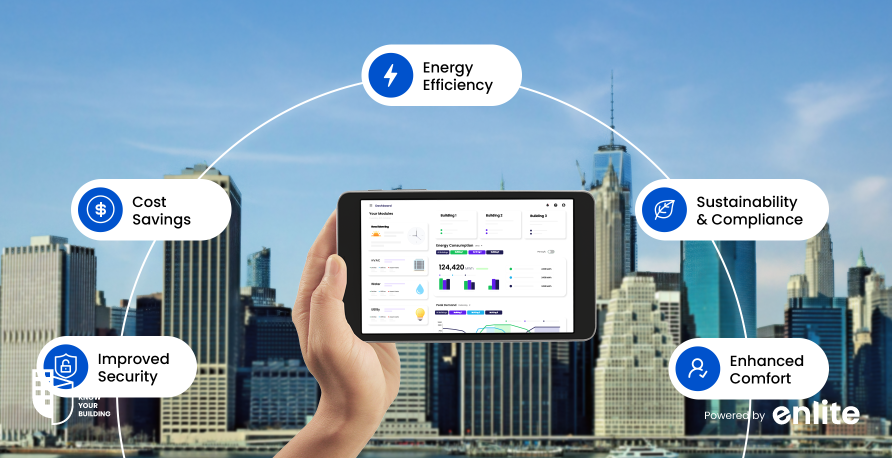Did you know that buildings account for nearly 40% of global carbon emissions? According to the World Green Building Council, a significant portion of these emissions comes from energy consumption in commercial buildings. As the world grapples with the urgent need to combat climate change, the commercial real estate sector is under immense pressure to adopt sustainable practices. One of the most effective tools at their disposal is the Building Management System (BMS). These systems not only help in reducing carbon emissions but also enhance the operational efficiency of buildings, making them indispensable in the modern era.
In today’s commercial real estate sector, the demand for sustainability and efficiency is at an all-time high. As companies and governments alike push for greener operations, Building Management Systems (BMS) are emerging as a crucial solution. These systems not only reduce carbon emissions but also enhance the operational efficiency of buildings, making them indispensable in the modern era.
1. Reducing Carbon Footprints
A. Energy Efficiency and Sustainability
The integration of BMS in commercial buildings leads to significant energy savings. Studies show that implementing a BMS can reduce energy consumption by up to 30%. By optimizing the use of HVAC, lighting, and other energy-intensive systems, BMS helps in lowering the overall carbon footprint, which is essential in meeting sustainability targets.
B. Integration with Renewable Energy Sources
BMS allows for seamless integration with renewable energy sources like solar panels and wind turbines. This integration ensures that buildings utilize clean energy to the maximum extent possible, further reducing reliance on fossil fuels and minimizing carbon emissions.
C. Real-Time Monitoring and Data Analytics
With advanced real-time monitoring and data analytics, BMS provides facility managers with actionable insights. By analyzing energy usage patterns, BMS can identify inefficiencies and suggest optimizations, leading to continuous improvements in energy efficiency and a reduced environmental impact.
2. Enhancing Operational Efficiency
A. Automation and Control
BMS offers unparalleled automation capabilities, ensuring that building systems operate efficiently without constant manual intervention. Automated control of lighting, temperature, and security not only enhances operational efficiency but also improves the reliability of building systems.
B. Predictive Maintenance
One of the key features of a modern BMS is predictive maintenance. By continuously monitoring the condition of equipment, BMS can predict potential failures and prompt maintenance before issues arise. This proactive approach reduces downtime and extends the lifespan of building systems, leading to significant cost savings.
C. Scalability and Flexibility
BMS are designed to be scalable, accommodating the growing needs of commercial real estate portfolios. Whether it’s integrating new technologies or expanding existing systems, BMS offers the flexibility to adapt to changing building requirements, ensuring long-term efficiency.
3. Enhancing Occupant Comfort and Productivity
A. Improved Indoor Environmental Quality
Indoor environmental quality (IEQ) is directly linked to occupant comfort and productivity. BMS maintains optimal levels of temperature, humidity, and air quality, creating a comfortable environment that boosts employee productivity and tenant satisfaction.
B. Intelligent Lighting Control
Lighting accounts for a significant portion of a building’s energy use. BMS enables intelligent lighting control, adjusting light levels based on occupancy and daylight availability. This saves energy and creates a more adaptable and pleasant working environment.
4. Compliance with Regulations and Standards
A. Meeting Environmental Regulations
Compliance with tightening environmental regulations is a major concern for commercial real estate owners. BMS ensures that buildings meet these standards by monitoring and controlling emissions and energy use, simplifying the process of compliance reporting.
B. Achieving Green Building Certifications
Green building certifications, such as LEED and BREEAM, are essential for demonstrating a building’s commitment to sustainability. BMS plays a pivotal role in achieving these certifications by optimizing energy efficiency and improving indoor environmental quality.
In the commercial real estate sector, the adoption of Building Management Systems (BMS) is not just a trend—it’s a necessity. With buildings contributing nearly 40% of global carbon emissions, the need for sustainable and efficient building management has never been greater. BMS provides a comprehensive solution that reduces energy consumption, enhances operational efficiency, and improves occupant comfort, all while ensuring compliance with environmental regulations.
As the demand for sustainable buildings continues to rise, now is the perfect time to explore how a BMS can benefit your property. Get a free consultation today to discover how our Building Management System can help reduce your building’s carbon footprint and enhance its efficiency. Contact us to learn more.














